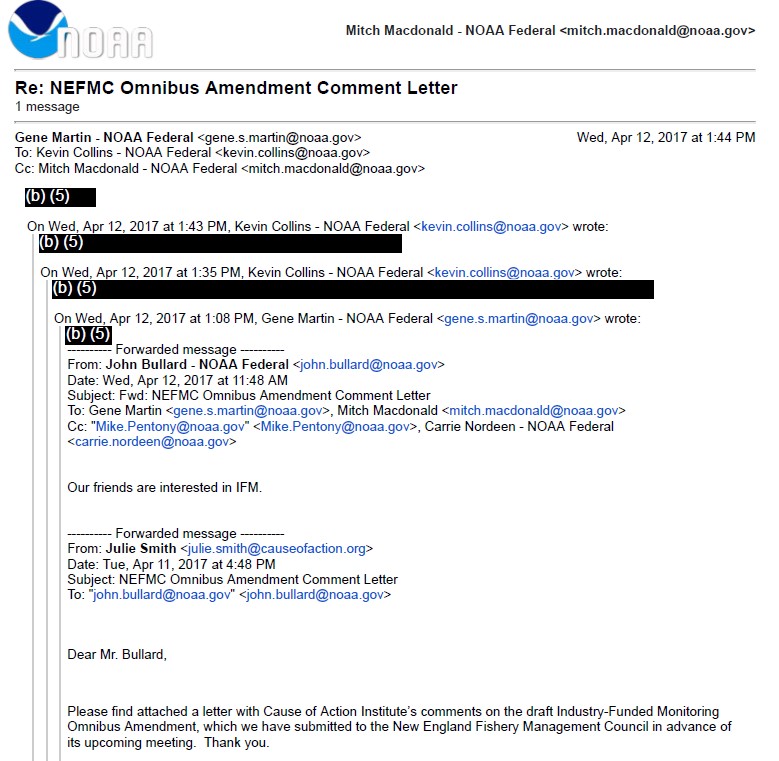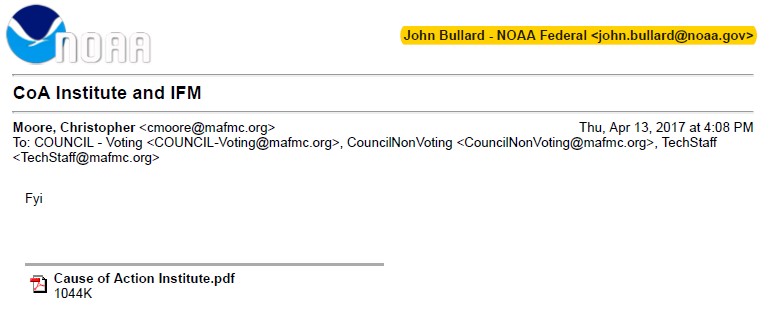Washington D.C. – Cause of Action Institute today filed a notice of appeal to the U.S. Court of Appeals for the District of Columbia Circuit on behalf of several family-owned fishing companies based in New Jersey, who hope to block a new regulation that would force them to pay for third-party “at-sea monitors.” That regulation—which was designed by the New England Fishery Management Council and promulgated by the National Oceanic Atmospheric Administration—requires certain boats in the Atlantic herring fishery to carry “at-sea monitors” and at industry’s cost, all without congressional authorization.
Family Fishermen Challenge Illegal, Industry-Killing At-Sea Monitoring Rule from Department of Commerce
Arlington, VA (Feb. 19, 2020) – Cause of Action Institute (“CoA Institute”) today filed a lawsuit on behalf of a group of New Jersey family fishermen to block a new regulation that would force them to pay for third-party “at-sea monitors.” The industry-killing rule—which was designed by the New England Fishery Management Council and promulgated by the National Oceanic and Atmospheric Administration and U.S. Department of Commerce—will require certain boats in the Atlantic herring fishery to carry “at-sea monitors” and at their own cost. Learn More
Cause of Action Institute Defends Fisheries from New Proposed Rule
CoA shared concerns about financial burden and legality of proposed rule
Today, Ryan Mulvey, counsel at Cause of Action Institute, spoke before the Mid-Atlantic Fishery Management Council (Council) in Annapolis, MD, about an Omnibus Amendment that would create new economic burdens on fishermen. The new rule, if enacted by the federal government, could increase costs on fishermen by as much as $810 per sea day. Mulvey also questioned whether the federal government had the authority to implement the new rule.
Ryan Mulvey issued the following statement:
“The federal government lacks clear statutory authorization to pass the Omnibus Amendment, and this rule could have devastating economic consequences on fishermen. I urged the Mid-Atlantic Council to investigate the serious legal ramifications of industry-funded monitoring schemes, and to protect the economic interests of small-business fishing firms in the Mid-Atlantic regions by asking the federal government to reject the Omnibus Amendment.”
A copy of Mulvey’s written comments for Cause of Action on the rule can be found here.
A blog about the rule and its legal and economic challenges can be found here.
____________________________________________________________
Media Contact: Matt Frendewey, matt.frendewey@causeofaction.org | 202-699-2018
CoA Institute Highlights Deficiencies in Proposed Rule to Shift Burdensome Costs of At-Sea Monitoring to Commercial Fishermen
The New England Fishery Management Council (NEFMC), in coordination with the National Marine Fisheries Service (NMFS), seeks to approve and implement a controversial set of regulatory amendments that would create a new industry-funding requirement for at-sea monitoring in the Atlantic herring fishery and, moreover, create a standardized process for introducing similar requirements in other New England fisheries. Under the so-called Omnibus Amendment, the fishing industry would be forced to bear the burdensome cost of allowing third-party monitors to ride their boats in line with the NEFMC’s supplemental monitoring goals. This would unfairly and unlawfully restrict economic opportunity in the fishing industry.
NOAA FOIA Response Suggests Refusal to Search Council Member Email Accounts for Records on At-Sea Monitoring Amendment
Earlier this month, Cause of Action Institute (“CoA Institute”) filed an administrative appeal of a final response by the National Oceanic and Atmospheric Administration (“NOAA”) to CoA Institute’s Freedom of Information Act (“FOIA”) request concerning NOAA’s efforts to expand industry funded at-sea monitoring—specifically, to the herring and mackerel fisheries—and to lay the foundation for industry funding across all of New England and the Mid-Atlantic. NOAA’s processing of the request suggests that the agency failed to search email accounts belonging to members of the fishery management councils even though they are subject to public disclosure. Based on the limited records that were disclosed, NOAA’s search appears improperly limited to its own employees.
The Industry-Funded Monitoring Omnibus Amendment
Over the past five years, the New England and Mid-Atlantic Fishery Management Councils (“NEFMC” and “MAFMC,” respectively) have worked on a controversial omnibus amendment that would require more fisherman to pay for at-sea monitoring. Industry-funded monitoring has already been imposed on the groundfish fleet, despite a long-fought legal challenge, devastating economic consequences, and historically-depressed fishery performance. Industry funding in the herring and mackerel fisheries will cost fishermen between $710–$818 per day at sea. That is more than the average daily revenue of many fishermen and will render fishing unprofitable for countless small-scale family businesses.
CoA Institute submitted a written comment in response to the poorly-designed and ill-timed omnibus amendment. Although the MAFMC decided to table the project for at least a year, the New England Council elected to forge ahead with the herring fishery. According to a recent presentation by NOAA staff, the agency is now reviewing a draft proposed rule. The NEFMC’s official “timeline” indicates the rule will be published this month. A final rule is expected to follow in June 2018.
The December 7, 2017 FOIA Request and Appeal
In an effort to investigate how the Councils and NOAA responded to our comment, we filed a FOIA request for “[a]ll records concerning” the comment, “including any correspondence between or amongst members of the New England and Mid-Atlantic Councils; officials, employees, or representatives of NOAA; or any other third party.” When we received a response, we were surprised that the agency only found seven responsive records—five of which were part of a single e-mail chain with most substantive content redacted to protect NOAA’s “deliberative” processes.
The other two records were an email that we sent to then-Regional Administrator John Bullard with a courtesy copy of our comment, and an email from Dr. Christopher Moore, Executive Director of the MAFMC, forwarding our comment to members of the Council.
NOAA failed to disclose any records from the members of the regional councils. Even the record from Dr. Moore was the version received by John Bullard, as highlighted here:
NOAA’s failure to locate, process, and disclose relevant records from Council members is a serious deficiency in its response. Council records—including members’ email correspondence—are subject to the FOIA, even if those records are stored in private email accounts. The regional councils conduct important business that has a serious impact on the livelihoods of Americans involved with the fishing industry. The process by which fishery rules are designed and implemented can already be less-than-transparent; any attempt to hide records from public scrutiny cannot be allowed to stand.
Follow-Up Public Records Requests to Massachusetts and Maryland
CoA Institute also filed state-level FOIA requests with Massachusetts and Maryland this week in order to access some of the records that NOAA has refused to disclose. These requests seek the same records sought from the federal government, but only to the extent they were created or received by John Quinn and Michael Luisi, the chairmen of the NEFMC and MAFMC, who used their state government email addresses to conduct council business.
Interestingly, sometime after CoA Institute submitted its comment, Dr. Quinn removed his University of Massachusetts email address from the NEFMC website, perhaps in order to dissuade the interested public from even attempting to file a state public records request.
CoA Institute is committed to fighting for the economic rights and liberties of everyday Americans, including those who face increasingly onerous regulation of their livelihoods. We also will fight against agencies that flout federal records management laws in an attempt to keep their regulatory efforts secret.
Ryan Mulvey is Counsel at Cause of Action Institute



Family Fishermen Move to Block Industry-Killing At-Sea Monitoring Rule
Herring Fishermen are Fighting Burdensome Regulation, COVID-19, and New, Unlawful Monitoring Requirements to Stay Afloat
Arlington, VA (June 8, 2020) – Cause of Action Institute (CoA Institute) today filed a motion for summary judgement on behalf of a group of New Jersey fishermen, asking a D.C. Federal Court to vacate job-killing fisheries regulations called the “Omnibus Amendment.” CoA Institute filed suit in February to challenge the industry-killing rule, which requires certain boats in the Atlantic herring fishery to carry “at-sea monitors” at their own cost.
Learn More